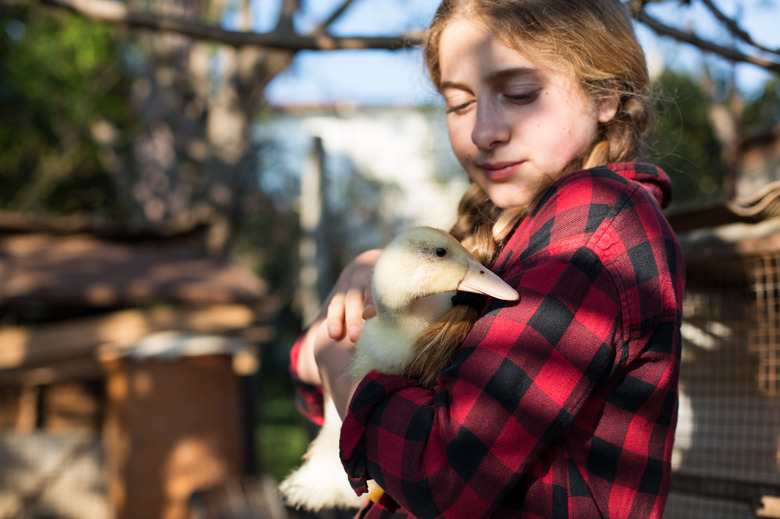Do Ducks Show Affection?
If you're looking to add an affectionate pet to your life, you might naturally think about getting a dog or cat. However, ducks can make affectionate companions, showing their love through snuggles and wanting to be around you, especially when raised from the time they hatch. Developing trust with your duck is essential to him showing affection to you.
The imprinting factor
The imprinting factor
Ducks bond with their family as soon as they hatch from the egg. Typically, a mother duck and her siblings are the first companions with whom a baby duck spends time, forming a deep bond known as imprinting. This imprinting bond is what is in play as ducklings follow their mother around in a line of fluff balls from their very earliest moments of life.
If you hatch your own duck eggs in an incubator, make sure to be on hand when your duckling hatches out of the egg. Talk to her, stroke her softly, and spend the first few hours of life in her presence as she dries in her brooder box, and you'll have a friend for life and will be the recipient of constant ducky affection. If you don't incubate your own eggs, a duck can still imprint on you if you get her during the first three days of life.
Unless you plan to be a duck's constant companion, however, it's best to have a fellow duckling or two hatch at the same time. They'll not only bond with you but with one another as well, meaning you'll be able to leave the house without leaving one lonely duck to quack loudly for your return. Ducks are social creatures and will quack incessantly for a companion if left by themselves.
Developing a bond
Developing a bond
You can help your duck develop and express his affection for you by creating a bond of trust with him from his earliest days. Get your duck used to all aspects of you. Be sure to talk to him so he gets used to the sound of your voice.
Gently stroke your duck and snuggle him in his brooder box with your hand so he can become familiar with your scent and the feel of your touch. Suss out what your duck's favorite treats are and teach your duck to eat out of your hand. You can do this by putting the food in front of the duckling first on his bedding and leaving your hand motionless nearby. Transition to feeding on your open palm.
As your duck matures, don't be surprised if he shows affection by nibbling at your fingers or toes at treat time. This rapid nibbling is a sign of duck affection and doesn't hurt. Ducks are naturally affectionate and easygoing and don't tend to bite humans. An aggressive duck bite is a hard pinch that can leave a bruise and is a sign that your duck could be in pain or is fearful of your intentions.
Cuddles and companionship
Cuddles and companionship
Ducks spend all of their time in family groups when they are young. Your pet duck will want to follow you around the house and be with you constantly wherever you go. When a duck feels comfortable in your presence, she will also snuggle up close beside you when you're sitting or lying down and will take a nap.
Encourage your duck's snuggles from the first day she comes to live with you. Pick her up with one hand on each side to keep her wings close to her body to prevent frantic flapping. Lift the duckling and rest one side of her body against yours, cradling it underneath with your free hand. You can also sit cross-legged on the floor and cuddle her on your lap, making sure to secure her wings.
Make sure to set her gently on the floor after you're done handling her, as a duck's legs are fairly fragile. Don't pick her up by the wings or neck, as this will make her afraid, and she'll tend to cower rather than show affection. As your duck becomes used to cuddling with you, expect that she'll want to snuggle whenever you're seated or lying down as a sign of her affection.
